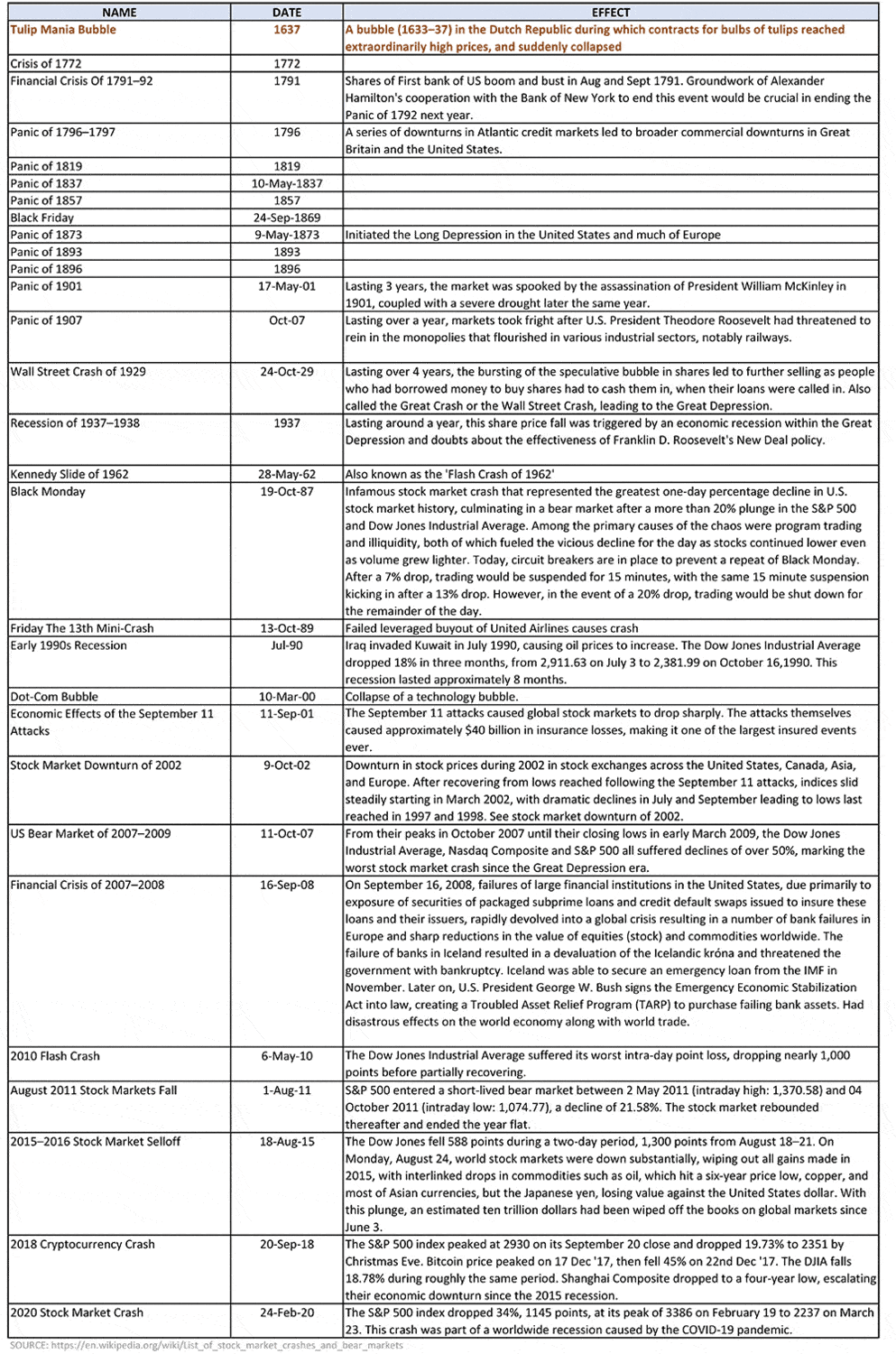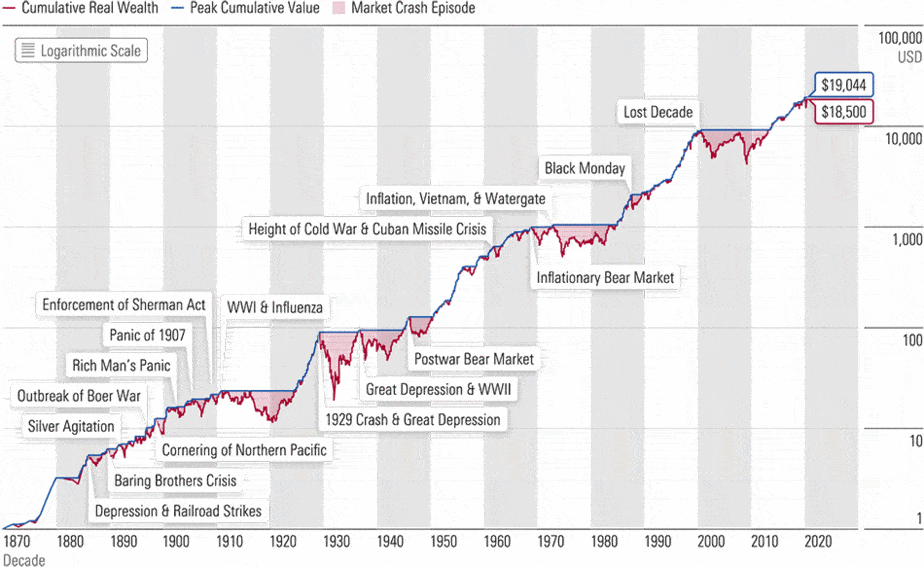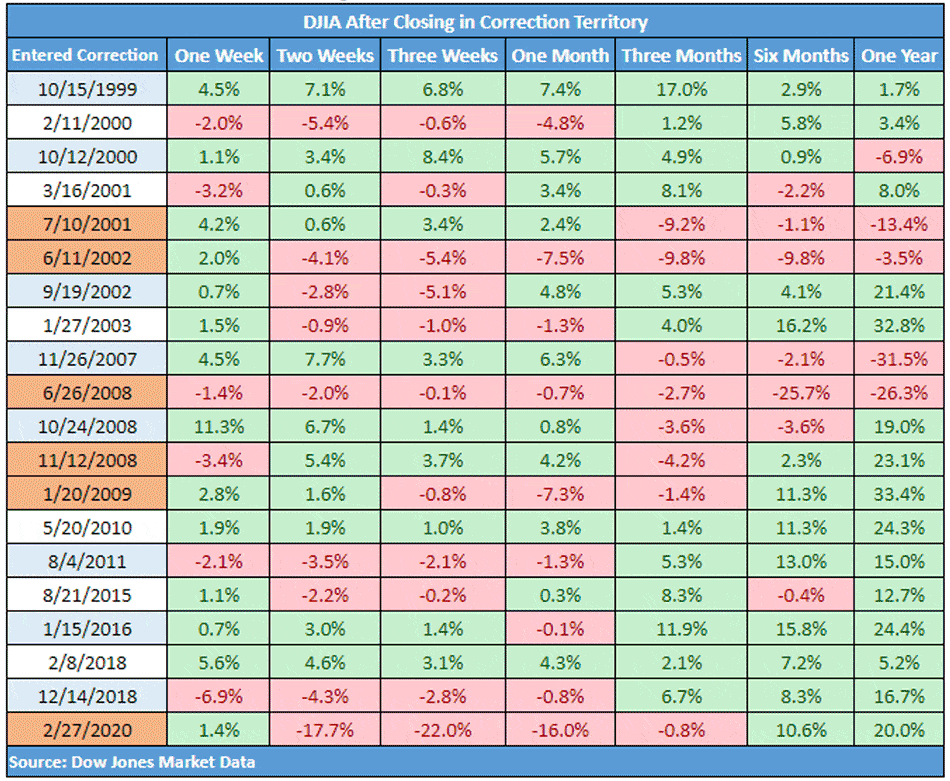
Here we go again. More negative market volatility and everyone is running in circles, pulling out their hair, screaming like Chicken Little that “The sky is falling!”
If you are new to trading stocks, these past weeks might seem very dark and worrisome. But those of you who have been in the markets for a decade or more know this is a regular market cycle that happens, and it will eventually figure itself out given enough time.
Patience is key to investing in the capital markets.
In my opinion, this is not a time to freak out. Rather, choose to be calm and disciplined while restraining yourself from not making any rash trading decisions.
As the famous slogan of the British during WWII told its citizens when bombs were raining down on London, "Keep Calm and Carry On."
The same applies today. We all need to step back, take a deep breath and know that right now this is NOT the end of the world.
In this article, I will provide a short history of past market crashes and discuss how the Oracle of Omaha, Warren Buffett, has not only weathered these downturns but has managed to come out on top of every market crash during his entire investment history dating back to 1942.

Bulls vs. bears. These are the eternal market forces that are bound together in a delicate dance between market gains and market crashes. It is literally at the foundation of our market system.
When conducting my research for this article, I was somewhat surprised how many market crashes the US has endured over its relatively short history. I found I had to remind myself that everything in life is cyclical.
By my calculations, there were 28 market crashes over the past 245 years.
That adds up to a market crash happening every 8.75 years on average!
Below I put together a spreadsheet of all the US market crashes I was able to identify.
First on the list is not a US market crash, but I thought it was interesting to include — The Tulip Bulb Bubble!?!

As you can see, market crashes are not all that uncommon and really are a large part of the US economic cycle.
This is a known fact, and intelligent traders should always be prepared for the down cycles. The goal is to be able to weather the lows and capitalize on the highs. (I’ll get into some strategies to achieve this goal further down in the article.)
For now, let’s continue to take a look at each of these crashes over the last 150 years.
The chart below is a great illustration of each market crash and the time it took for the market to recover.

Looking at the chart, what stands out for me is the 1918 influenza pandemic that hit the US economy and resulted in a 15-year market slump. We will see if our current COVID pandemic mirrors history.
The ‘Roaring 20s’ followed and led to the Great Depression which lasted over 20 years.
I also see market crashes becoming less frequent than they were prior to 1910 with longer periods of market gains.
The point of this chart is that historically, market crashes have always turned positive, and seasoned long-term investors have seen the value of their investments come back and continue to grow, given enough time and patience.
The Lesson: Stay the course!
Over the long term, it really doesn’t matter if the market crashes. Markets have historically always recovered, more recently in a relatively short period of time. The eternal struggle between bull and bear markets is always happening and investors should not fret.
Today’s market slump is no different than others that have happened over the past 150 years. It amounts to a blip in the long upward trend of increased market value.
Check out the S&P 500 index chart from 1950 through 2021 below. Each market crash is highlighted with its respective cause.
Again, you can see they are evenly spread out with a frequency that is fairly predictable. Each is followed by another upward trend.

The takeaway again is that after each downdraft, there is a corresponding updraft in market value that follows. Again, long-term investors will see gains by being patient and holding the course.
For sure watching your portfolio valuation skid 10%, 15% or even 20% in the short-term can be disconcerting, but there is relief in knowing that over the long-term, markets do recover over time.
According to Dow Jones Market Data going back to 1896, on average the Dow will gain in the weeks and months following a market correction.[1]

And of the past 20 corrections, the Dow has been positive 12 months later 75% of the time.[2]


Now let’s turn our attention to one of the greatest investors of all time, Warren Buffett.
He is known as the ‘Oracle of Omaha’ for a reason, and investors around the world study his investment strategies religiously.
Buffett bought his first stock at age 11 in the spring of 1942 when the US was suffering heavy losses in World War II.
That was 80 years ago…
Today his famous fund, Berkshire Hathaway, has weathered many downturns in the markets since its inception in 1965. It also boasts significant gains over this period when compared to the S&P 500 index.
The 2021 Berkshire Hathaway shareholder report was recently released and reported a +29.6% return for 2021![3]
From the 2021 shareholders report, the fund realized a Compounded Annual Gain (1965–2021) of 20.1% vs. the S&P gain of 10.5% during the same period.[4]
The Overall Gain (1964–2021) of the fund has been a whopping 3,641,613% vs. the 30,209% gain seen by the S&P 500.[5]
Needless to say, Buffett has a strategy that obviously works over the long haul.
And even Buffett will admit that every year has not been all roses.
On a year-by-year basis, Buffet's fund has had many "off" years, even for this investing guru.
But while there were some down years, overall his investment decisions have proven to be very sound and earned investors in his fund a handsome return over the long-term.
Buffett is a strong believer in the strength and resilience of the American economy.
He has reiterated this belief over and over through the years.
In his 2018 Berkshire annual shareholder meeting he said:
"All you had to do was figure that America was going to do well over time, that we would overcome the current difficulties.”
And again in 2020:
"I was convinced of this in World War II. I was convinced of it during the Cuban Missile Crisis, 9/11, the financial crisis — that nothing can basically stop America," he said, adding, "We faced tougher problems, and the American miracle, the American magic, has always prevailed, and it will do so again."
"Never bet against America," he went on to say.
So how does Buffett do it?
What are his recommendations for his followers during times of heavy negative volatility pushing into bear market territory?
I found an interview Buffett made back in 2014 when the Russians were invading Crimea and the markets went south.
That market period had many similarities to today. His recommendations basically boiled down to three main points.
That he said was the best way to build wealth.
Some other pearls of wisdom from the ‘Oracle of Omaha’ from that interview:
"If stocks are cheaper, I'll be more likely to be buying them," he said, celebrating the fact that a stock he was actively buying had dropped in price. Buffett went on to say that he wouldn't cash out even if the conflict escalated into another cold war or World War III.[6]
"Well, if you tell me all of that is going to happen, I will still be buying the stock," he said. "You're going to invest your money in something over time. The one thing you could be quite sure of is if we went into some very major war, the value of money would go down.
"I mean, that's happened in virtually every war that I'm aware of," Buffett continued. "So the last thing you'd want to do is hold money during a war."
Buffett stressed that the US stock market rose during WWII and has only increased over time.
"American businesses are going to be worth more money," Buffett said. "Dollars are going to be worth less, so that money won't buy you quite as much.
"But you're going to be a lot better off owning productive assets over the next 50 years," he added.[7]
In the Berkshire shareholder report in 2018, Buffett recounts his first stock purchase over 80 years ago.
It was 1942; the US was suffering heavy losses in WWII. He purchased three shares of Cities Service for $115.
He went on to point out that had he invested that money in a no-fee S&P 500 Index fund and reinvested all the dividends, that investment of $115 would be worth over $600k in 2019 — a +5,288-fold gain.
If he had put that same investment ($115) in gold, the value would have only been $4,200 during that same period of time.
Takeaway: Buy stocks, not gold, during times of war and economic crisis.
My recommendation: Buy the future, such as 5G, esports & fintech.
For the intelligent investor, times like these are moments to rejoice. It is a great opportunity to purchase equities at value prices and increase one’s holdings.
Here are Buffett’s ‘Four Investment Pillars’ to consider when looking for companies to consider adding to your portfolio.
And if all of this is too much work or goes way over your head, do not fret. You can still profit from equities without doing anything.
Buffett recommends to just put your money in an index fund and forget about it.
He eloquently points out that an investment of $10,000 in 1942 into an index fund, reinvesting all dividends, would be worth over $51 MILLION dollars today!
Check this clip of Buffett telling his followers this bit of advice:
As I have illustrated, good things come for patient investors willing to invest long-term and not allow market cycles to interrupt their overall investment strategy.
The ups and downs of the markets are a normal phenomenon and should be viewed as possibly an opportunity, not some great travesty.
The historical data clearly shows that the American economy is strong and resilient over time. The capital markets do fall, recover and move on to ever greater valuations over time.
Warren Buffett is the perfect example of an intelligent investor and should be a mentor for all of us to follow.
He has over 80 years of investment experience to share. His recommendations for investors should be heeded faithfully. He has been through more market crashes than most investors in history and has always come out on top.
His Berkshire Hathaway fund continues to serve up handsome profits for its investors and this is the result of his slow and steady hand at the helm.
The takeaway from this article is this: Market crashes and negative volatility come and go. Stay the course, remain patient and you will be rewarded over time.
In other words, Keep Calm and Carry On.

MF Williams, Contributor
for Investors News Service
P.S. To discover more opportunities in the hottest sectors in North America, sign up now to the Financial News Now newsletter to get the latest updates and investment ideas directly in your inbox!
DISCLAIMER: Investing in any securities is highly speculative. Please be sure to always do your own due diligence before making any investment decisions. Read our full disclaimer here.
[1] https://www.marketwatch.com/story/the-next-shoe-to-drop-the-125-year-old-dow-industrials-on-brink-of-correction-heres-what-history-says-happens-next-in-the-u-s-stock-market-11645651055?siteid=yhoof2
[2] Ibid.
[3] 2021 10-K and Annual Report
[4] Ibid.
[5] Ibid.
[6] https://markets.businessinsider.com/news/stocks/warren-buffett-berkshire-hathaway-russia-ukraine-stocks-gold-bitcoin-dollars-2022-2
[7] Ibid.